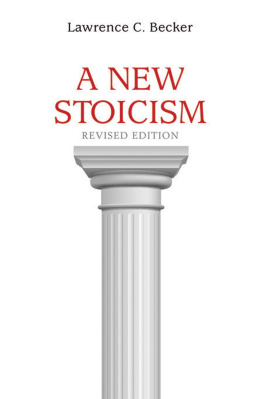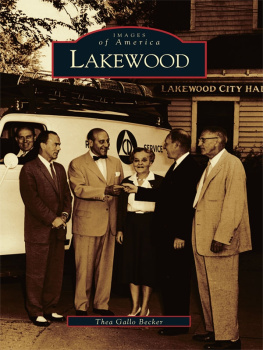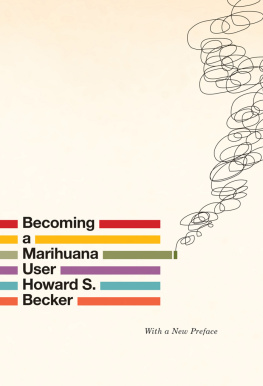
Free Press
An Imprint of Simon & Schuster, Inc.
1230 Avenue of the Americas
New York, NY 10020
www.SimonandSchuster.com
Copyright 1963 by The Free Press of Glencoe
Copyright renewed 1991 by Howard S. Becker
Chapter 10, Labelling Theory Reconsidered, copyright 1973 by Howard S. Becker
Chapter 11, Why Was Outsiders a Hit? Why Is It Still a Hit? and Chapter 12, Why I Am Not the Reason Marijuana Is Being Legalized, 2018 by Howard S. Becker
All rights reserved, including the right to reproduce this book or portions thereof in any form whatsoever. For information address Free Press Subsidiary Rights Department, 1230 Avenue of the Americas, New York, NY 10020.
This Free Press trade paperback edition August 2018
FREE PRESS and colophon are trademarks of Simon & Schuster, Inc.
For information about special discounts for bulk purchases, please contact Simon & Schuster Special Sales at 1-866-506-1949 or .
The Simon & Schuster Speakers Bureau can bring authors to your live event. For more information or to book an event contact the Simon & Schuster Speakers Bureau at 1-866-248-3049 or visit our website at www.simonspeakers.com.
Cover design by Ryan Raphael based on the previous edition designed by Carin Berger Design
Cover photograph by Earl Ripling/Photonica
Library of Congress Cataloging-in-Publication Data is available.
ISBN 978-1-9821-0622-5
ISBN 978-1-4391-3636-2 (ebook)
Sometimes I aint so sho whos got ere a right to say when a man is crazy and when he aint. Sometimes I think it aint none of us pure crazy and aint none of us pure sane until the balance of us talks him that-a-way. Its like it aint so much what a fellow does, but its the way the majority of folks is looking at him when he does it.
William Faulkner, As I Lay Dying
Acknowledgments
Four chapters of this book originally appeared in slightly different form elsewhere. Chapter 3 appeared in the American Journal of Sociology , LIX (November 1953); Chapter 5 appeared in the same journal, LVII (September 1951). Both are reprinted here with the permission of the Journal and the University of Chicago Press. Chapter 4 appeared in Human Organization , 12 (Spring 1953), and is reprinted here with the permission of the Society for Applied Anthropology. Chapter 6 appeared in Social Problems , 3 (July 1955), and is reprinted with the permission of the Society for the Study of Social Problems.
The material in Chapters 3 and 4 was originally prepared as a masters thesis in Sociology at the University of Chicago, under the direction of Everett C. Hughes, W. Lloyd Warner, and Harvey L. Smith. Dan C. Lortie commented on an early draft of one of the papers.
I did the research on which Chapters 5 and 6 are based while I was a member of the staff of the Chicago Narcotics Survey, a project undertaken by the Chicago Area Projects, Inc., with the help of a grant from the National Institute of Mental Health. Harold Finestone, Eliot Freidson, Erving Goffman, Solomon Kobrin, Henry McKay, Anselm Strauss, and the late R. Richard Wohl criticized early versions of these papers.
Im grateful to Jonathan Karp for seeing merit in my proposal to create a new edition of Outsiders , to Megan Hogan for her skillful and speedy editorial direction of the project, and to Fred Chase for his valuable copy editing.
Preface to Outsiders (2018)
Outsiders was first published in 1963. A new edition, with a new last chapter, followed ten years later. Time hasnt stood still since then and neither has sociology. But I have decided to let the book retain its original format unchangedexcept for an attempt to address some new questions that have been raised by time having gone by. Thus, the new section called Forty-Five Years Later: Some New Questions.
In fact, only two new questions in two brand-new chapters. Since 1963, Outsiders has continued to be read and used as a textbook: What can account for this striking longevity? That question turns us to a consideration of how universities work and in what ways they are dependent on the people they recruit to fill the positions of teacher and student. This inquiry will take us back to the 1960s, to reactions to the war in Vietnam, some more local, like the shootings at Kent State University or the Democratic presidential nominating convention in Chicago, as well as more subtle changes in the recruitment of teachers and students.
The second new question concerns a major cultural change that has happened since Outsiders was published: the legalization of marijuana. When I did my research on marijuana use, in the early 1950s, you could say two things for sure. The plant was certainly disapproved of officially: marijuana use was a crime everywhere in the United States, as well as elsewhere. But marijuana law enforcement affected mainly racial and ethnic minorities. Local police and federal officials generally focused their attention on drugs that generated more serious crimes, as heroin use did in minority neighborhoods. Middle- and upper-class marijuana users seldom experienced police actions unless they were unusually lax in taking simple precautions. (And, we shouldnt forget, marijuana grew wild in many parts of the United States and many users found and harvested plants along the roadside, and took them home to be turned into easily smoked and enjoyed products.)
Fifty years later a large number of state and local jurisdictions have legalized the use of marijuana for medical purposes and a subset of them have legalized recreational use as well. Enough time has gone by that almost anything could have happened in the public sphere. Yet few changes of this magnitude did occur on the public and legislative arena.
More often than I would like, people tell me that I was responsible for the legalization of marijuana, and congratulate me on this demonstration of what sociology can accomplish. I would love to take credit for such a momentous change, but Im a sociologist, and one who insists on having proof for statements like that. And I know that the proof isnt there. So the second new chapter for this book is called Why I Am Not The Reason Marijuana Is Being Legalized.
1
Outsiders
All social groups make rules and attempt, at some times and under some circumstances, to enforce them. Social rules define situations and the kinds of behavior appropriate to them, specifying some actions as right and forbidding others as wrong. When a rule is enforced, the person who is supposed to have broken it may be seen as a special kind of person, one who cannot be trusted to live by the rules agreed on by the group. He is regarded as an outsider.
But the person who is thus labelled an outsider may have a different view of the matter. He may not accept the rule by which he is being judged and may not regard those who judge him as either competent or legitimately entitled to do so. Hence, a second meaning of the term emerges: the rule-breaker may feel his judges are outsiders.
In what follows, I will try to clarify the situation and process pointed to by this double-barrelled term: the situations of rule-breaking and rule-enforcement and the processes by which some people come to break rules and others to enforce them.
Some preliminary distinctions are in order. Rules may be of a great many kinds. They may be formally enacted into law, and in this case the police power of the state may be used in enforcing them. In other cases, they represent informal agreements, newly arrived at or encrusted with the sanction of age and tradition; rules of this kind are enforced by informal sanctions of various kinds.













